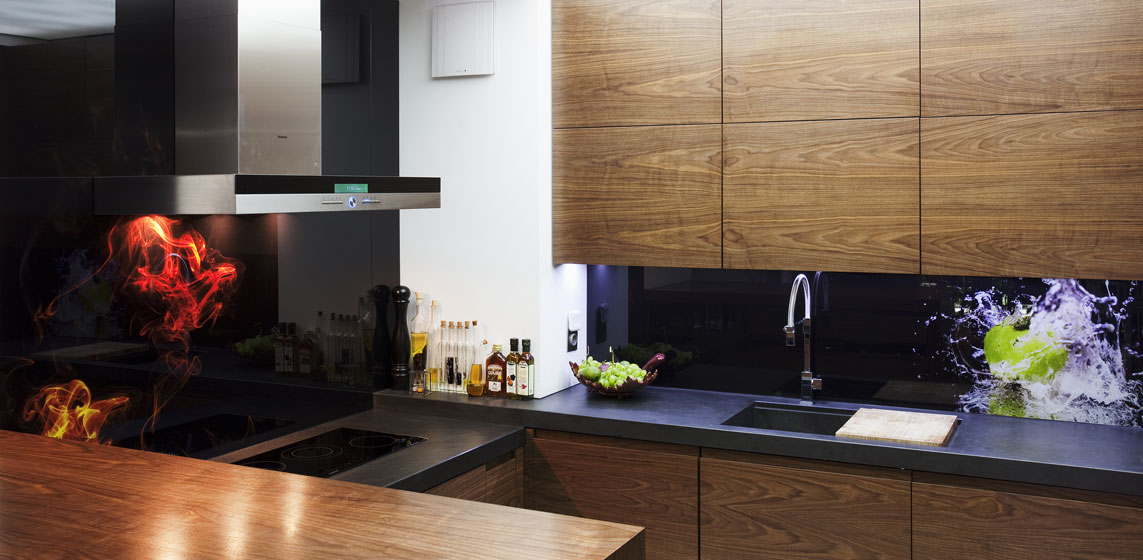
Polish printing company D-POS have built a clientele base of interior designers, architects and collectors, with Mimaki playing a crucial role in their expansion
Marcin Krakowiak und Bartłomiej Jakóbowski gründeten D-POS – eine kleine, aber feine polnische Druckerei – im Jahr 2000. Inzwischen sind sie seit mehr als 20 Jahren in Warschau tätig. Anfänglich erzeugten sie ausschließlich POS-Material (Point of Sale) für namhafte Kunden im Verbrauchsgütersegment, darunter Nestlé, Wedel, Tchibo, Henkel, Johnson&Johnson und Coty. Seit nunmehr zwölf Jahren stützt sich D-POS auf die Drucktechnologie von Mimaki. Dank dieser Technologie konnte sich das Unternehmen als vielseitiger Anbieter im Druckmarkt etablieren – und nicht nur im POS-Bereich.
Zu seinem Kundenkreis gehören heute Innenausstatter, Architekten und Sammler. Für sie erzeugt D-POS kundenindividuelle Tapeten, Aufkleber und eine ganze Reihe von Oberflächenanwendungen. Marcin Krakowiak erklärt den breitgefächerten Kundenstamm wie folgt: „Ich glaube, dass unsere einzigartige Position im Markt auf unsere enorm vielseitigen Druckanwendungen zurückzuführen ist, bei deren Bereitstellung die Mimaki-Technologien einen wichtigen Beitrag leisten. Gepaart mit unserem vollen Einsatz für jedes Projekt und unserer umfangreichen Erfahrung im Markt hat dies es uns ermöglicht, unseren Kunden kontinuierlich bestmögliche Serviceleistungen zu erbringen.“
„Am Anfang entwarfen und produzierten wir POS und POP (Point of Purchase) aus Kunststoff-, Metall- und Holzelementen für Werbeständer, Regale, Flüssigkeitsspender und Displays.“ Krakowiak erzählt weiter: „Wir hatten immer Siebdruck-, Thermoform- und Kunststoff-Biegemaschinen eingesetzt. Aber im Jahr 2008 beschlossen wir, uns nach einem vielseitigen, hochwertigen UV-Flachbett-Drucker umzusehen. Hierbei entdeckten wir Teba, unseren lokalen polnischen Mimaki-Vertriebspartner.“
Der Beginn einer dauerhaften Partnerschaft
Noch im gleichen Jahr nahm D-POS die Zusammenarbeit mit Teba auf und hat es nicht bereut. Nur wenige Wochen nach dem Kauf des ersten Mimaki-Druckers (JFX-1631) über den Händler erweiterte D-POS seinen Maschinenpark durch den JV33-130 und den JV33-160. Heute besitzt das Unternehmen sieben verschiedene Mimaki-Geräte, darunter den UJV500-160, den CG-130FXII und die JFX Serie. Der jüngste Neuzugang ist der JV300-160 Plus, in den das Unternehmen im März 2020 investierte. Die 2019 eingeführte Plus-Serie von Mimaki zeichnet sich durch weitaus höhere Produktivität als die Vorgängermodelle aus und bietet eine hervorragende Druckqualität bei höherer Druckgeschwindigkeit. Bereits am Tag nach der Installation des neuesten Systems konnte D-POS den Druck des nächsten Grafikauftrags für ein Museum in Angriff nehmen.
„Teba hat bei allen unseren Investitionen in Mimaki-Geräte eine wichtige Rolle gespielt“, betont Krakowiak, der den polnischen Vertriebspartner in höchsten Tönen lobt. „Die Fachkenntnisse, die Professionalität und die Einsatzbereitschaft seiner Mitarbeiter gaben uns von Anfang an ein Gefühl der Sicherheit, und wir wissen die Unterstützung zu schätzen, die sie uns weiterhin gewähren.“
Was die Druckmaschinen selbst angeht, so ist Krakowiaks Vertrauen in die Technologie seit der Installation der ersten Maschine kein einziges Mal ins Wanken geraten. „Wir investieren weiter in Mimaki, weil wir vollstes Vertrauen in die Marke haben. Wir wissen, dass wir eine zuverlässige, hochwertige Lösung erhalten, die uns auch die zur Ausweitung unserer Geschäfte notwendige Flexibilität bietet.“
Endlose Möglichkeiten
Im Zuge des Erwerbs weiterer Maschinen mit Mimaki-Technologien begann das Unternehmen, einen Vorstoß in neue Marktsegmente zu wagen. „Die Technologie ermöglichte es uns, viele neue Geschäftschancen im Markt zu erkunden, die uns früher unzugänglich waren“, so Krakowiak. „Zuerst entwarfen wir Wandgemälde und Glastafeln für private und gewerbliche Innenräume. Und ehe wir uns versahen, bearbeiteten wir Aufträge aus allen möglichen Sektoren, von Innenausstattern und Architekten bis hin zu unseren POS-Kunden.“
In den letzten paar Jahren hat D-POS viele komplexe, hochwertige Dekorationen hergestellt, darunter Fototapeten für POLIN (Museum der Geschichte der polnischen Juden) und Glastafeln für ORLEN-Tankstellen in Polen. Weil D-POS verschiedenartige Mimaki-Technologien zur Verfügung stehen, scheut das Unternehmen nicht davor zurück, sich an die Dekoration fast aller denkbaren Materialien zu wagen. Bedruckt werden unter anderem Glas, Beton, Metall, Holz, Kunststoff und vieles mehr.
„Es ist wirklich schockierend, wie viele Kunden uns erzählen, ihre Druckaufträge würden andernorts mit der Begründung ‚nicht machbar‘ abgelehnt“, sagt Krakowiak. „Bei D-POS lehnen wir diese Denkweise grundsätzlich ab. Bloß weil etwas bisher noch nicht getan wurde, heißt das nicht, dass es nicht getan werden kann.“
D-POS kann vielfältige Kundenprojekte mit Leichtigkeit erledigen, ohne dabei Effizienz und Erschwinglichkeit einbüßen zu müssen. „Mit den Produkten von Mimaki können wir als Unternehmen zeit- und kosteneffizient sein und gleichzeitig unsere gewohnte hohe Qualität und Detailgenauigkeit erzielen“, fügt Krakowiak hinzu. Insbesondere wies er auf die Glastafel-Anwendungen hin, bei denen D-POS eine Fotoqualität erzielen konnte, ohne spezielle Profile einzusetzen.
Auf Höhenflug
Krakowiak und Jakóbowski lenken das Unternehmen weiterhin in neue und spannende Richtungen. Der nächste Versuch verbindet ihre Leidenschaft für Paragliding mit ihrer Expertise im Druckbereich: individualisierte Gleitschirme für Paraglider. Auch hier spielt die Mimaki-Technologie eine wichtige Rolle.
„Wir experimentieren schon eine Weile mit dem Bedrucken von Textilien und dem Zuschneiden der Schirme. Weil bei der Herstellung dieser Art von Produkten die Sicherheit so wichtig ist, sind im Entwicklungsprozess größte Sorgfalt und Präzision notwendig. Wir haben aber schon einige wichtige Fortschritte erzielt“, erklärt Krakowiak. „Die erfolgreiche Aufnahme derart einzigartiger Anwendungen in unser Angebot ermöglicht es uns, der Konkurrenz einen Schritt voraus zu bleiben. Die Lösungen von Mimaki werden auch weiterhin Gewicht bei der Erweiterung unseres Anwendungsangebots haben. Denn wenn Mimaki Innovationen entwickelt und sein Produktangebot ausweitet, können auch wir dies tun.“
„Diese Branche ist schnelllebig und wettbewerbsorientiert. Aber mit Teba und Mimaki als Technologiepartner streben wir an, unserem Ruf als Höhenflieger in immer mehr Märkten gerecht zu werden und zu bleiben“, schließt Krakowiak.












